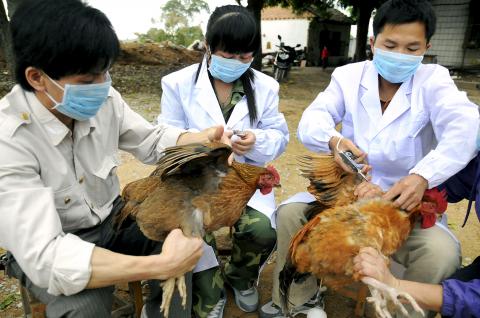China said it was mobilizing resources nationwide to combat a new strain of deadly bird flu that has killed four people, as Japan and Hong Kong stepped up vigilance against the virus and Vietnam banned imports of Chinese poultry.
The H7N9 bird flu strain does not appear to be transmitted from human to human, but authorities in Hong Kong yesterday raised a preliminary alert and said they were taking precautions at the airport.
In Japan, airports have put up posters at entry points warning all passengers from China to seek medical attention if they suspect they have bird flu.

Photo: Reuters.
A total of 14 people in China have been confirmed to have contracted H7N9, all in the east of the country.
Another 2 persons died yesterday, in Shanghai, bringing the number of deaths to five, state media said.
Xinhua news agency said the victim was a 48-year-old man who worked delivering poultry.
“[China] will strengthen its leadership in combating the virus ... and coordinate and deploy the entire nation’s health system to combat the virus,” the Chinese Health Ministry said in a statement late on Wednesday on its Web site.
In Hong Kong, authorities activated the preliminary “Alert Response Level” under a preparedness plan for an influenza pandemic, which calls for close monitoring of chicken farms, vaccination, culling drills and a suspension of imports of live birds from China.
All passengers on flights in and out of Hong Kong were being asked to notify flight attendants or airport staff if they were feeling unwell.
Vietnam said it had banned poultry imports from China, citing the risks from H7N9.
Flu experts across the world are studying samples isolated from the patients to assess the human pandemic potential of the strain, because no animals infected with H7N9 have yet been found.

The US government has signed defense cooperation agreements with Japan and the Philippines to boost the deterrence capabilities of countries in the first island chain, a report by the National Security Bureau (NSB) showed. The main countries on the first island chain include the two nations and Taiwan. The bureau is to present the report at a meeting of the legislature’s Foreign Affairs and National Defense Committee tomorrow. The US military has deployed Typhon missile systems to Japan’s Yamaguchi Prefecture and Zambales province in the Philippines during their joint military exercises. It has also installed NMESIS anti-ship systems in Japan’s Okinawa

‘WIN-WIN’: The Philippines, and central and eastern European countries are important potential drone cooperation partners, Minister of Foreign Affairs Lin Chia-lung said Minister of Foreign Affairs Lin Chia-lung (林佳龍) in an interview published yesterday confirmed that there are joint ventures between Taiwan and Poland in the drone industry. Lin made the remark in an exclusive interview with the Chinese-language Liberty Times (the Taipei Times’ sister paper). The government-backed Taiwan Excellence Drone International Business Opportunities Alliance and the Polish Chamber of Unmanned Systems on Wednesday last week signed a memorandum of understanding in Poland to develop a “non-China” supply chain for drones and work together on key technologies. Asked if Taiwan prioritized Poland among central and eastern European countries in drone collaboration, Lin

BACK TO WORK? Prosecutors said they are considering filing an appeal, while the Hsinchu City Government said it has applied for Ann Kao’s reinstatement as mayor The High Court yesterday found suspended Hsinchu mayor Ann Kao (高虹安) not guilty of embezzling assistant fees, reducing her sentence to six months in prison commutable to a fine from seven years and four months. The verdict acquitted Kao of the corruption charge, but found her guilty of causing a public official to commit document forgery. The High Prosecutors’ Office said it is reviewing the ruling and considering whether to file an appeal. The Taipei District Court in July last year sentenced Kao to seven years and four months in prison, along with a four-year deprivation of civil rights, for contravening the Anti-Corruption

NO CONFIDENCE MOTION? The premier said that being toppled by the legislature for defending the Constitution would be a democratic badge of honor for him Premier Cho Jung-tai (卓榮泰) yesterday announced that the Cabinet would not countersign the amendments to the local revenue-sharing law passed by the Legislative Yuan last month. Cho said the decision not to countersign the amendments to the Act Governing the Allocation of Government Revenues and Expenditures (財政收支劃分法) was made in accordance with the Constitution. “The decision aims to safeguard our Constitution,” he said. The Constitution stipulates the president shall, in accordance with law, promulgate laws and issue mandates with the countersignature of the head of the Executive Yuan, or with the countersignatures of both the head of the Executive Yuan and ministers or